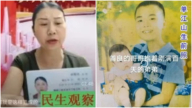【新唐人2015年02月06日讯】在中国大陆,当局对于网路舆论的管控是持续升级。中共最高法院日前公布,网上言论、微博和手机简讯等可作为呈堂证供。同一天,国家互联网信息办公布,网络注册将全面推行“实名制”。对此,有律师指出,当局的举动不但旨在严控网络言论,更重要的是为治罪政治异见人士做法律铺垫。
据中共官方媒体报导,最高法院2月4号发布了有关《民事诉讼法》最新司法解释(以下称《民诉法司法解释》),进一步明确了在民事案件中作为证据的“视听资料”和“电子数据”的具体类型——视听资料包括录音资料和影像资料;电子数据包括网上聊天记录、微博、手机简讯、电子邮件、电子数据交换、博客、电子签名、域名等都可以作为民事案件中的呈堂证供。
然而,这样一则简短的司法解释,却受到了外界的格外关注。网友们嘲讽般的彼此提醒,今后在网上说话要注意了,“随意”的发泄、批评甚至开玩笑都可能要付出代价的。多家媒体分析则认为,上述新规的实施,将有助于中共当局进一步打压网络言论。
纽约律师叶宁:“因为这些普通的小众传媒,是普通老百姓用来进行表达的唯一可以用的工具和手段。如果这些东西都可以直截了当的作为诉讼活动当中的证据的话,那么老百姓在使用这些小众媒体的时候,不得不小心翼翼自律自己的行为,自律自己的表达。它实际上已经‘巧妙’的实行了规范网民的目的了。”
纽约律师叶宁指出,录音资料和影像资料,在美国的证据法当中,属于“道听途说”的资料,本身不能独立的成为证据,不能在正式的民事或刑事诉讼当中直接作为证据。他对于中共当局能否正确实施新规感到担忧。
叶宁:“作为一个法律专业人士,对这一条的规定,我是有所保留,而且是有着很大疑虑和忧虑的。我们如果透过现象来看本质的话,这样一种证据的直接采纳,作为程序诉讼活动当中的证据,而不是设置严格限制的话,那么给国家公权力滥用权力提供了更加广大的空间。”
值得关注的是,在《民诉法司法解释》发布的同一天,“国信办”正式出台了《互联网用户账号名称管理规定》,宣布从3月1号起,网络注册将全面推行“实名制”。机构或个人在博客、微博、即时通讯工具(包括微信、QQ、Skype等)、论坛、贴吧、跟帖评论等互联网信息服务中使用的账号,要通过真实身份信息认证后注册。
网友“秀才江湖”:“它就是为了钳制言论自由,知道老百姓对它们不满,想压制批评的声音,就实名制,动机就是为了限制公民的批评权。”
对此,网民们纷纷调侃,最高法的司法解释加上国信办的“实名制”,两者相结合,简直就是专门为异议人士量身打造的所谓法律。
叶宁:“这两者一联系的话,一个是实名制,你这个证据跑不掉的将来。因为一搞实名制的话,你所有言论都记录在案。第二个,你这些被记录在案的言论,包括小众媒体上发的意见,将来都是可以作为反对你、对你施加民事赔偿的证据。所以这个问题实际上它背后包含着很大政治目的,而且包含着反人类价值观内容在后面。”
去年8月,中共当局出台“微信十条”,要求个人公共微信账号不得发布或转载时政类新闻;今年1月,当局又要求网络文学作品作者必须实名注册;今年2月4号,中共官方再祭出被称为“账号十条”,又称“昵称十条”的新规,要求任何机构或个人注册使用的网络用户账号名,不得危害国家安全。中共当局的一系列措施被外界视为不断加强管控网络言论。
叶宁指出,中国整个国家正在向着大监狱的方向,快速发展。但“秀才江湖”表示,中国人说真话的欲望已经很难阻挡,再多的高压政策也一样。
采访编辑/张天宇
Microblogging to be Used as Evidence?
Internet and public opinion management and control
keeps on escalating in China.
The Chinese Communist Party (CCP) Supreme Court recently
announced that online speech, microblogging SMS, and so
on can be used as evidence in court.
The same day, State Internet Information Office (SCITO) said
that real-name network registration will be fully implemented.
Lawyers pointed out that the authorities don’t just want to
strictly control online speech.
More importantly they want to lay out the legal groundwork
to charge political dissidents.
The CCP official media published on Feb. 4 that the Supreme
Court produced the latest judicial interpretation of Civil
Procedure, which further clarifies specific types of “audio-
visual materials" and “electronic data".
These mediums can be used as evidence in civil cases,
including audio data and image data such as online chat,
microblogging, SMS, e-mail, electronic data interchange,
blog, e-signature, domain names and so on.
This brief judicial interpretation received a lot of attention
from the outside world.
Netizens remind each other to pay attention to speaking
online in the future.
They might now pay a price for casual
complaints, criticism and even joking.
Media analyzed that implementation of these new regulations
will help the CCP further suppress online speech.
New York lawyer Ye Ning, “These ordinary niche media
are the only tools for ordinary people to express themselves.
If even these can be as directly used as evidence in courts,
people have to carefully discipline themselves when using
these niche media. So the CCP has cleverly achieved the
goal of disciplining online users."
Ye Ning pointed out that recording data and image data
are “hearsay" information and cannot be independent
evidence itself in the U.S. It cannot be used directly as
evidence in formal civil or criminal proceedings.
He is concerned about if the CCP will correctly
implement the new regulations.
Ye Ning, “As a legal professional I have reservations,
even lots of doubts and worries on this provision.
If we look into the nature of the issue, direct adoption
of such evidence for litigation without strict restrictions
will give more room for the authorities to abuse power."
It is noteworthy that on the same day that the judicial
interpretation was released, SCITO formally released
the “Provisions on the Administration of Internet Users
Account Name".
It announced that from Mar. 1, the “Real Name System"
will be fully implemented in network registration.
Institution or individual accounts of blog, microblog,
instant messaging tools (including Wechat, QQ, Skype),
forums, and posting online comments need real identity
confirmation during the registration process.
Netizen Xiucai Jianghu, “It is to suppress freedom of speech.
They know people are not happy about them.
They want to suppress critical voices using the real-name
system and to limit citizens’ rights to criticize."
Netizens joke that the combination of the Supreme Court’s
judicial interpretation and SCITO’s “Real-Name System"
is specifically tailored to target dissidents.
Ye Ning, “With the Real-Name System,
all your comments are on record.
The recorded comments can be used as evidence against
you and to press for civil damages.
The move actually contains great political purpose,
including being against the values of humanity."
Last August, the CCP issued “Ten Articles on Wechat"
forbidding personal public Wechat accounts to publish
or spread political news. In January 2015, the authorities
require online literary writers use real-name registration.
On Feb. 4 2015, CCP released “Ten Article on Accounts".
This forbids any institution or individual network users to
use account names that harm national security.
The CCP’s measures are interpreted by the outside world as
strengthening of online speech management and control.
Ye Ning said that China is moving to quickly
become a large prison.
But netizen Xiucai Jianghu said Chinese peoples’
desire to tell the truth has become difficult to stop.
It doesn’t matter how many high-pressure policies there are.
Interview & Edit/Zhang Tianyu






























